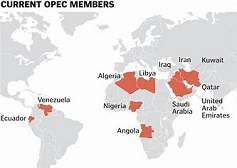By NJ Ayuk – In this article the writer argues that delayed organization of the Petroleum Exporting Countries (OPEC) cuts mean opportunity for African members. Quota-related decisions made at OPEC’s 35th meeting last June in Vienna delivered a call to action for African member states to step up production through the remainder of the year and into 2024.
Many of OPEC’s African member states had been struggling to produce enough crude to meet the targets set for them last year. As a result, they found themselves accepting even lower quotas this year. Decisions regarding production cuts for African members Algeria, Angola, Congo, Equatorial Guinea, Gabon, and Nigeria are summarized in the African Energy Chamber’s (AEC) newly released outlook report, “The State of African Energy Q2 2023.”
Our report also notes easing of the civil unrest that resulted in the exclusion of member state Libya from OPEC cuts for the time being. OPEC’s meeting, which included OPEC+ oil-exporting countries as well, resulted in a Declaration of Cooperation that delays further cuts to production targets until 2024 and continues voluntary cuts by nine member states until the end of 2023. Algeria and Gabon are the two African members among those volunteers.
The 2024 Targets and Expected African Production
OPEC’s signed declaration calls for a significantly lower cumulative production target for African member states: about 4.33 million barrels per day (MMbbls/d) of crude oil.
A look at the targets of OPEC’s two leading African oil producers — Nigeria and Angola — shows considerable reductions from the 2023 quotas set at the 33rd OPEC and non-OPEC Ministerial Meeting (ONOMM). Nigeria’s 2024 target, 1.38, represents a reduction of 360,000 barrels per day (bpd), and Angola’s quota went down by 175,000 bpd to 1.28 MMbbls/d.
Despite these reduced quotas, it is not anticipated that either country will reach theirs in 2024; Nigeria is expected to hit 95% of its target, Angola 75%. Nigeria, although estimated to be capable of producing 2.2 MMbbls/d, has faced challenges such as oil theft, sabotage, and technical issues. Angola, despite increased oil and gas activity in 2023, has still strained in recent months to produce more than 1.1 MMbbls/d, far short of its current 1.46 MMbbls/d target from OPEC.
Congo is also expected to fall short of its production target, at about 10% less than allowed, while Equatorial Guinea and Gabon will likely produce slightly over their target numbers of 70,000 bpd and 177,000 bpd respectively, avoiding compliance as in the past. Of the members in sub-Saharan Africa, only Gabon has achieved its target this year.
Algeria in the north is another high achiever, with production capacity that exceeds its 2024 OPEC target of 959,000 bpd. It has agreed to cut output by 96,000 bpd to comply. Meanwhile, its next-door neighbor, Libya, achieved an average of 1.26 MMbbls/d for 2023 after recovering from drastic production outages during 2022 civil disturbances. OPEC cuts for 2024 have not been set for Libya, allowing the country to use oil reserves to assist with reconstruction efforts.
Crude production in several African nations has been stymied by lack of adequate investment, political unrest, and technical issues associated with older wells. Following an assessment of the Declaration of Cooperation by IHS, Wood Mackenzie, and Rystad Energy, the 2024 targets for Nigeria and Congo may be revised based on their anticipated levels of production.
Strategies for a Better-Than-Expected 2024 and Beyond
The delayed OPEC production cuts clearly showcase an urgent need for African countries to up their current production numbers and prove that higher quotas are warranted, which would also increase African negotiating sway at future meetings.
The possibility of target modification “to equal the average production that can be achieved in 2024,” particularly for Congo and Nigeria, was raised in a June OPEC announcement that followed the meeting. Angola was also mentioned as having production plans “subject to verification…before the end of 2024.”
Acknowledging both the opportunity and the urgency, the head of geopolitics for London-based research firm Energy Aspects, Richard Bronze, stated that the deal “certainly creates an incentive for these three countries (Angola, Congo, and Nigeria) to try and demonstrate they can raise production before year-end, but we think they are unlikely to be able to manage it.”
The time is now for African OPEC members to prove that they can achieve the higher output capability that warrants higher baselines.
The calls for government action that I and the AEC have stressed in recent years are more urgent than ever: African governments need to create the kind of positive, enabling climate that will encourage greater exploration and production. Good financial policies will help in that effort, as will ethical, transparent, and efficient governance.
Prioritizing speedy adoption and execution of measures to achieve these goals will bring what is most needed to boost African production numbers — increased interest from international oil companies and investors.
A united effort to awaken more investor interest in African oil should start now, as should cooperation among African members to present a more unified voice when the 36th OPEC meeting is held in November, 2023. The OPEC – Africa Roundtable at the African Energy Week in Cape Town, will ensure Africa specific issues are addressed and as well as global energy security issues.
As S&P Global noted, this strategy would be “taking a page from their Middle East counterparts, who typically align their positions before contentious negotiations through pre-meeting consultations.”
I encourage Africa’s member nations to do what it takes to increase investment, production, and their influence at the OPEC table. You are stronger together.

